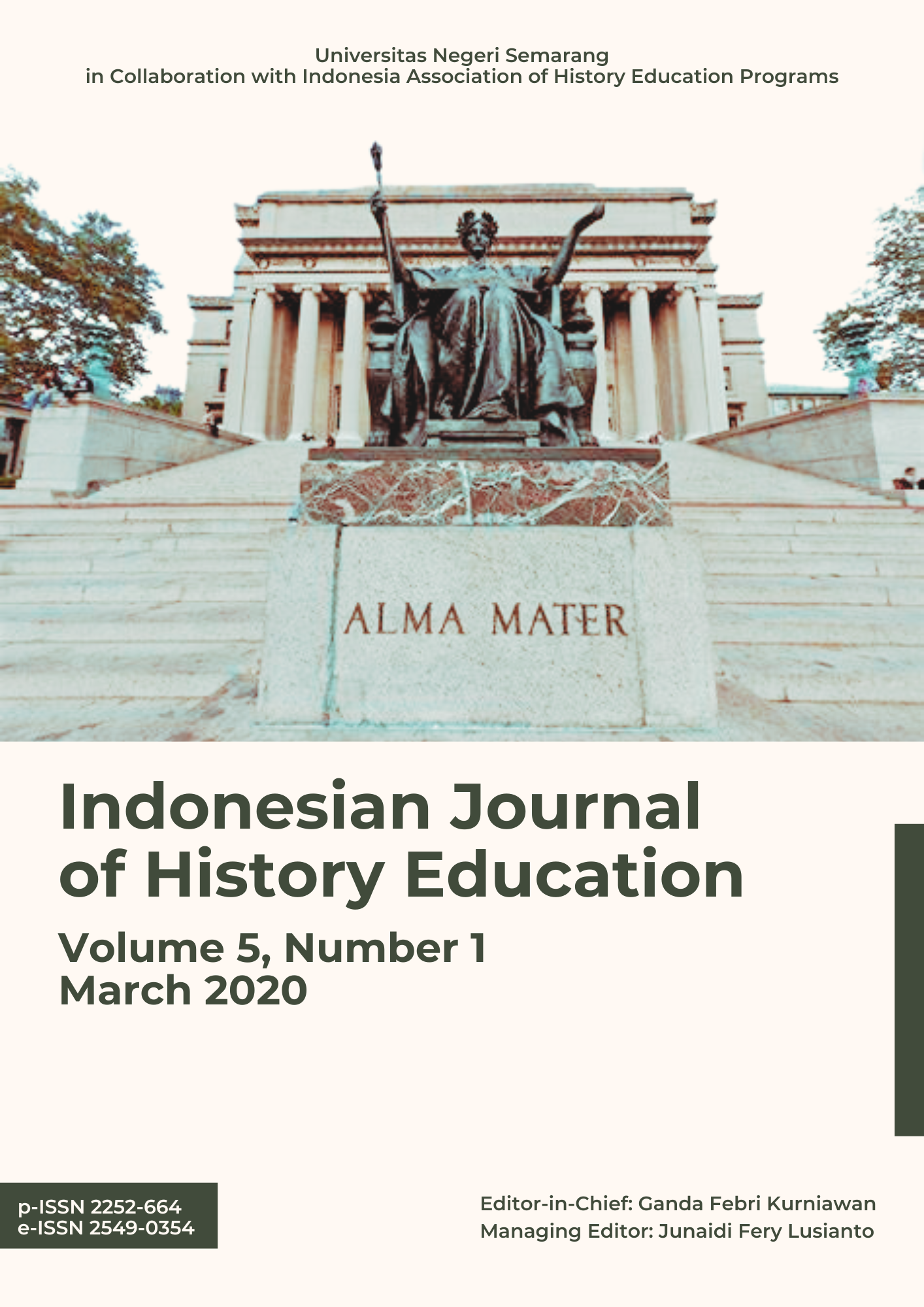Development of a Small Historian Learning Model Based on a Local History Site Surakarta Kasunanan Palace on the Sub-Discussion of the Islamic Kingdom Era in Indonesia Class X MAN 1 Surakarta
Abstract
The objectives of this research are: (1) to analyze the learning condition in X grade before the development of learning model sejarawan kecil, (2) to analyze the development process of learning model sejarawan kecil based on the local history of Kasunanan Surakarta palace, (3) to know the feasibility of learning model sejarawan kecil based on the results of validation by model experts. The research method used in this research is Research and Development (R&D) with a qualitative approach, which is grouped into two stages: preliminary study and development study. The result of this research indicates that (1) the learning models that teachers use in history lessons at X grade of MAN 1 Surakarta are less varied because of limited knowledge about the procedure of innovative learning models; also, history learning that introduces students to the skills of history research that using local history never been used before. (2) In the development study, the design of the learning model sejarawan kecil based on the local history of Kasunanan Surakarta palace is validated internally by model experts and practitioners. (3) After passing the two stages of validation by model experts, the design of the learning model sejarawan kecil based on the local history of Kasunanan Surakarta palace has gained eligibility to be used on the field without revision.
References
Ekawati, M. (2019). Teori belajar menurut aliran psikologi kognitif serta implikasinya dalam proses belajar dan pembelajaran. E-TECH: jurnal ilmiah teknologi pendidikan, 7(2), 1-12.
Farida, F., Khoirunnisa, Y., & Putra, R. W. Y. (2018). Pengembangan bahan ajar gamifikasi pada materi bangun ruang sisi lengkung. Jurnal Penelitian dan Pembelajaran Matematika, 11(2).
Habsari, N. T. (2015). Kontribusi Pendidikan Sejarah dalam Pengembangan Modal Sosial untuk Mewujudkan Nasionalisme. In SEMINAR INTERNASIONAL 2015 (p. 103).
Hasan, S. H. (2003). Problematika pendidikan sejarah. Bandung: FPIPS UPI.
Huda, M. (2013). Model-model pengajaran dan pembelajaran: Isu-isu metodis dan paradigmatis.
Kemendikbud. (2014). Dokumen Kurikulum 2013. Jakarta: Kemendikbud
Kochhar, S.K. (2008). Pembelajaran Sejarah: Teaching of History. Jakarta: PT. Gramedia Widiasarana Indonesia
Kurniawati, K. (2015). Mencari Makna dalam Sejarah: Meninjau Kembali Historiografi Indonesiasentris Sebagai Sumber Belajar Sejarah. Jurnal Pendidikan Sejarah, 4(2), 13-20.
Maksum, H., & Purwanto, W. (2019). Model Pembelajaran Pendidikan Vokasi Otomotif (PVO). UNP PRESS.
Mariyaningsih, N., & Hidayati, M. (2018). Bukan Kelas Biasa: Teori dan Praktik Berbagai Model dan Metode Pembelajaran menerapkan inovasi pembelajaran di kelas-kelas inspiratif. CV Kekata Group.
Maryani, I., & Fatmawati, L. (2018). Pendekatan scientific dalam pembelajaran di sekolah dasar: teori dan praktik. Deepublish.
Mulyana, A., & Gunawan, R. (2007). Sejarah lokal penulisan dan pembelajaran di sekolah. Bandung: Salamina.
Nugroho, I. R., & Ruwanto, B. (2017). Pengembangan media pembelajaran fisika berbasis media sosial instagram sebagai sumber belajar mandiri untuk meningkatkan motivasi dan prestasi belajar fisika siswa kelas XI SMA. Jurnal Pendidikan Fisika, 6(6), 460-470.
Prastowo, A. (2018). Sumber belajar dan pusat sumber belajar: Teori dan Aplikasinya di Sekolah/Madrasah. Kencana.
Purnamasari, I. (2011). Pengembangan model pembelajaran sejarah berbasis situs sejarah lokal di SMA negeri kabupaten temanggung. Paramita: Historical Studies Journal, 21(2).
Romadi, dan Ganda F. Kurniawan. (2017). “Pembelajaran Sejarah Lokal Berbasis Folklore Untuk Menanamkan Nilai Kearifan Lokal Kepada Siswa”. Dalam Jurnal Sejarah dan Budaya. Vol. 11. Hal. 79-94. Diunduh pada tanggal 22 Oktober 2017 dari http://journal2.um.ac.id/index.php/sejarah dan-budaya/article/view/1515/810
Rusydiyah, E. F. (2019). Teknologi Pembelajaran: implementasi pembelajaran era 4.0.
Sugiyono, S. (2015). Metode Penelitian & Pengembangan “Research and Development” Untuk Bidang Pendidikan, Manajemen, Sosial, Teknik.
Sepriady, J. (2016). Contextual teaching and learning dalam pembelajaran sejarah. Kalpataru: Jurnal Sejarah dan Pembelajaran Sejarah, 2(2), 100-110.
Suharso, R. (1992). Persepsi Siswa terhadap pengajaran sejarah. Jurnal Paramita.
Suprijono, A. (2009). Cooperative learning: teori & aplikasi PAIKEM. Pustaka pelajar.
Trianto, S. P., & Pd, M. (2007). Model-model pembelajaran inovatif berorientasi Konstruktivistik. Jakarta: Prestasi Pustaka.
Yuliana, A. (2016). Pembelajaran Sejarah Lokal, Nilai-Nilai dan Aplikasi. In Prosiding Seminar Nasional Program Studi Pendidikan Sejarah se-Indonesia: Kajian Muatan dan Posisi Mata Pelajaran Sejarah di Kurikulum 2013 (p. 32).
Yusuf, D. (2013). Materi Sejarah Lokal Dalam Implementasi Pendekatan Scientific Kurikulum 2013. Bandung: Universitas Pendidikan Indonesia. Diunduh pada tanggal 06 Januari 2016 dari https://sejarahakademika.blogspot.co.id/2013/12/sejarah-lokal-sebagai-penyempurnaan.html?m=1
Copyright (c) 2020 Indonesian Journal of History Education

This work is licensed under a Creative Commons Attribution 4.0 International License.
Copyright Notice
An author who publishes in the Jurnal Indonesian Journal of History Education agrees to the following terms:
- Author retains the copyright and grants the journal the right of first publication of the work simultaneously licensed under the Creative Commons Attribution-ShareAlike 4.0 License that allows others to share the work with an acknowledgement of the work's authorship and initial publication in this journal
- Author is able to enter into separate, additional contractual arrangements for the non-exclusive distribution of the journal's published version of the work (e.g., post it to an institutional repository or publish it in a book) with the acknowledgement of its initial publication in this journal.
- Author is permitted and encouraged to post his/her work online (e.g., in institutional repositories or on their website) prior to and during the submission process, as it can lead to productive exchanges, as well as earlier and greater citation of the published work (See The Effect of Open Access).
Read more about the Creative Commons Attribution-ShareAlike 4.0 Licence here: https://creativecommons.org/licenses/by-sa/4.0/.




